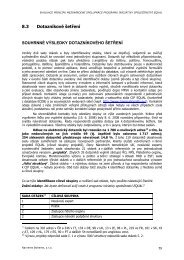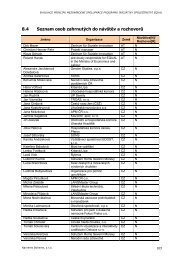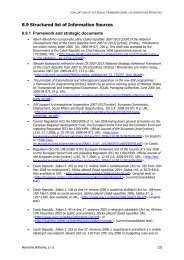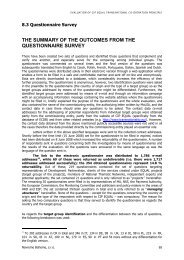EQUAL - Final report - eng - navreme
EQUAL - Final report - eng - navreme
EQUAL - Final report - eng - navreme
You also want an ePaper? Increase the reach of your titles
YUMPU automatically turns print PDFs into web optimized ePapers that Google loves.
EVALUATION OF CIP <strong>EQUAL</strong> TRANSNATIONAL CO-OPERATION PRINCIPLE<br />
several member states. This activity must build on a transnational, inter-governmental agreement and<br />
specification of an assignment for monitoring or evaluation from the position of the given group of<br />
countries. At the same time, the reasoning is possible rather at the level of comparisons (of similarities<br />
or on the contrary, of differences), in it how the individual accents in the priorities of the thematic<br />
(intervention) areas in the given countries, in the wider context of the European Employment<br />
Strategy, are stipulated. With regard to the fact that such setting will most probably exceed the<br />
competencies of the ministries, inter-governmental agreements would have to be concerned. At the<br />
same time these agreements would have to stipulate the responsibilities for system administration and<br />
sharing the costs connected with its development and operation.<br />
Individual countries create also monitoring and evaluation plans, e.g. “Northern Ireland European<br />
Social Fund Programme 2007 – 2013” mentions in Chapter 4 Evaluation in paragraph 4.24 the<br />
evaluation strategy in the first half of the programme: having carried out the substantial part of the<br />
project activities to evaluate the contribution (added value) of the programme to the strategic<br />
intentions of the EU, the Member State and the region and, in particular the innovative, supranational<br />
and interregional activities and horizontal themes. The evaluation strategy of the North Irish ESF<br />
programme will be updated for the second half of the programme’s duration in order to take account<br />
of the regional socio-economical and political development. In the United Kingdom, the West Wales<br />
and the Valleys Convergence Programme - Operational Programme for the ESF mentions in Chapter 3<br />
– Strategy, paragraph 3.131 that the managing authority shall establish an independent Transnational<br />
Cooperation Unit to support the programme activities. Then in Chapter 6 in paragraphs 6.40 – 6.42<br />
the planning tool of the managing authority “Strategic Frameworks” is described as an implementation<br />
strategy to achieve the strategic objective by means of strategically interconnected project<br />
interventions. These frameworks will serve in selection of the projects, they will enable their<br />
comparison. Thus the managing authority will be able to identify projects proposing transnational or<br />
interregional cooperation already in the stage of submission and selection and to direct them towards<br />
achieving of the programme objectives. It will be able to provide them specific assistance also during<br />
the implementation and monitor and evaluate them purposefully in cooperation with the Monitoring<br />
Committee. The East Wales Regional Competitiveness & Employment Programme for the ESF 2007–<br />
2013 is drawn up accordingly. Both these programmes will thus be implemented, monitored and<br />
evaluated with the managing authority’s active participation, without prejudice to the Monitoring<br />
Committee’s power and responsibility.<br />
5.6 Management of the CIP <strong>EQUAL</strong> and other HRD<br />
programmes funded from the ESF<br />
Management and implementation of the transnational cooperation priority axis does not arise in<br />
vacuum, it follows up with the previous experience in management of similar programmes and it does<br />
not definitely assume that it will leave the begun tradition completely. On the contrary, this is<br />
obviously the solution to the basic question, the general problem connected with management of any<br />
programmes: namely to what extent to set the rules and restrictions in such a way that the exerted<br />
endeavour would really reflect in the improved quality of the implemented projects. It appears that<br />
obviously the surest answer is the link-up with the traditions, the implementing entities’ expectations<br />
and the previous experience, from which this results as a rule. The priority axis management must<br />
work necessarily with the context of the Czech environment, thus with the relatively low experience of<br />
the project implementing entities in transnational partnerships and (sometimes) with the partnership<br />
at all, smaller stability of institutions and weak links between the transnational and national level of<br />
the partnership. In the countries that were included in the evaluation, various measures were<br />
recommended and somewhere also implemented. For example, creation of a special measure or a<br />
project at the programme management level (not at the project level) was concerned, which will<br />
facilitate the process of search for the partners and formation of the transnational partnership; in<br />
some countries this type of measures is implemented in the form recommendation of minimum extent<br />
of the partnership, which countries to focus on when searching for partners (further to the national<br />
strategies), which activities shall be str<strong>eng</strong>thened (it is generally recommended to limit generic<br />
activities that miss the concrete content); somewhere this principle was transposed into formation of a<br />
concrete physical institution, the mission of which is to support transnational partnership in the<br />
projects in the given programme. A recommendation to announce gradually successive calls, some of<br />
Navreme Boheme, s.r.o. 41











